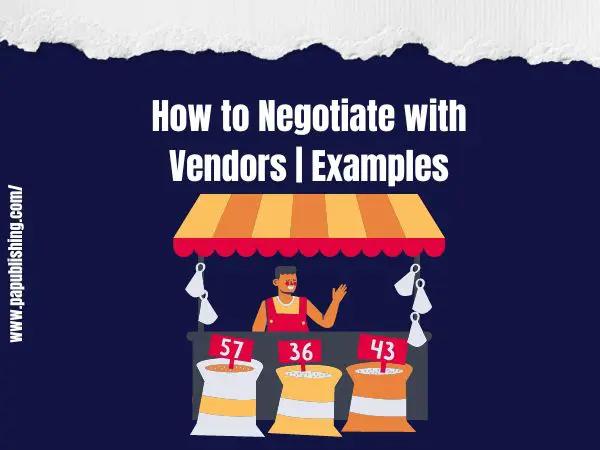How to Negotiate with Vendors? Examples
Knowing how to negotiate with vendors is a vital skill every business owner should have, especially for small businesses. Negotiating is more than just about getting what you want. It’s a strategic skill that helps you refine your ability to secure better deals and transform simple interactions into long-running partnerships.
That’s why, in this article, we’ve delved into various tips and strategies that explain how to negotiate with vendors and secure the best deals.
Importance of Negotiating With Vendors
Before we learn how to negotiate with vendors, let’s delve into why negotiation is so important in the first place:
- Reduced Costs: Negotiating with vendors can lead to better prices for their products and services. Businesses can then use these savings to maintain a profit or invest in areas that need improvement.
- Improved Terms: Effective negotiation can improve the terms of your contract and get more out of your vendor. This includes discussing delivery schedules, returns, warranty conditions, etc.
- Relationship Building: A mutually beneficial negotiation with your vendor can strengthen your relationship with them. This leads to better communication and flexibility in future dealings.
How to Negotiate with Vendors?
With one in every five businesses failing in their first year, business owners need to learn how to negotiate with vendors for better deals. So, here’s a few tips to get you started:
- Do Your Research
Before entering into negotiations with vendors, it’s important to have sufficient information to support your position. This would require research on related topics, such as the products or services you need, their market prices, the quality standards, etc. It also helps to gain information on the other party, like their wholesale price, competitors’ prices, and previous client reviews.
With research, you can set realistic expectations for yourself and gain leverage during negotiations. For example, if vendors typically offer discounts on large purchases, you can use this information to secure a cheaper price.
- Build Trust and Rapport
Maintaining a strong relationship with your vendors can go a long way during negotiations. So, speak to them in person whenever possible, mindfully commit to conversations, and show genuine interest in their business. This will foster a positive environment between both parties and incline the vendors to offer more favorable deals.
You can also use this opportunity to ask vendors more about your field. Demonstrate that you want to learn the details of the business to stay on top of things. This will garner respect from the vendors, as they prefer to partner with well-informed business owners.
- Source Quotes From Multiple Vendors
Another way of gaining a leg up during negotiations is to collect quotes from multiple other vendors. Even if you’ve already decided on a supplier, comparing prices can help you identify the better deal. You can then use this information during negotiations to let them know you’re open to considering alternatives.
For example, you can inform one vendor that another is offering a similar product at a lower rate. This can strike a competitive nerve in the first vendor and prompt them to match or beat that price.
- Set a Price Target
Setting a price target for yourself will help anchor the discussions toward a specific goal. Of course, whatever target you settle for should be based on research and aligned with your budget. So, before negotiating the total costs, prepare a mental estimate of what you’re willing to pay and the discount you’d like to see.
If the vendor’s initial offer exceeds your target, use the research and multiple quotes to formulate a counteroffer. However, you should also be willing to compromise on less significant details to reach a mutually beneficial agreement.
Conclusion
Now that you’ve learned how to negotiate with vendors, you’ll be able to secure better prices and improve the terms of your contract. Just remember to research related topics and set a price target before negotiations. It also helps to gather quotes from several vendors and build rapport with them.



